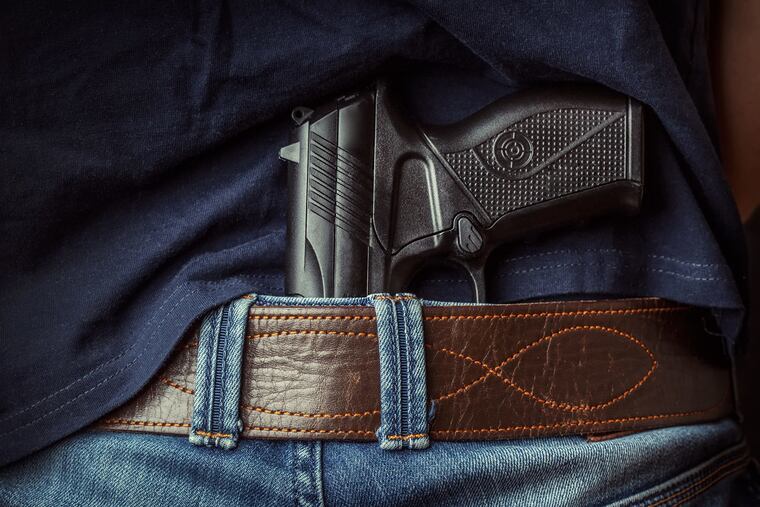If you legally qualify for a gun permit, you should get one
The Supreme Court was right — New York’s decision to place an additional restriction on concealed carry permits was ripe for abuse.

Before the decision that overturned Roe v. Wade, the most controversial case of the Supreme Court term that just ended was New York State Rifle & Pistol Association v. Bruen, concerning the right to a permit to carry a gun in New York. The suit was in response to New York’s requirement that people applying for permits to carry a concealed gun in public show “proper cause” — meaning, a need for self-defense.
But on June 23, the court held that New York’s restrictive law violated the Second and 14th Amendments to the Constitution.
What does that mean to those of us in Pennsylvania? Absolutely nothing. The law in this commonwealth, as in more than 40 other states, was already in line with what the court said the Constitution requires. That’s because Pennsylvania is what’s known as a “shall issue” state; New Jersey and Delaware, however, are “may issue” states.
A shall-issue state like Pennsylvania will issue a concealed carry permit to anyone who meets the legal requirements. That doesn’t mean just anyone can get a permit — the law carves out several groups including convicted felons, people “not of sound mind,” and “habitual drunkards.” But if you are legally qualified, you get the permit.
That sounds a lot like how most permits work. Do you meet the requirements? Yes? Then you get the permit.
“Do you meet the requirements? Yes? Then you get the permit.”
New York’s law — like New Jersey’s — was more subjective. In New York, as a “may issue” state, the government may issue you a license if you meet the criteria, but they can also choose not to if the state believes applicants haven’t demonstrated a “proper cause” for having a license and proven it to the satisfaction of a “licensing officer” — a judge in most counties, but the local police or county sheriff in others.
In no other circumstances do we require people to apply to the subjective judgment of a cop or judge before they can exercise a right. If this were any other civil right, New York’s law would have long ago set off alarm bells in the minds of liberals. And indeed, some on the left in New York got that message, including the Black Attorneys of Legal Aid, the Bronx Defenders, and the Brooklyn Defender Services, all of which joined several other groups in an amicus brief in support of striking down the law.
» READ MORE: The Supreme Court’s gun ruling impacts New Jersey’s concealed-carry laws. Here’s what to know.
These groups know that when you make a right dependent on the government’s subjective say-so, it is no right at all. More specifically, they argued: “New York enacted its firearm licensing requirements to criminalize gun ownership by racial and ethnic minorities. That remains the effect of its enforcement by police and prosecutors today.”
Letting cops decide who gets guns has not worked out the way many progressives would wish.
New York’s law was unjust. Making states set up objective standards (like the ones we have in Pennsylvania) ensures that all citizens are treated equally.
None of this means that state officials need to ease up on gun restrictions, including prosecuting existing gun crimes. In Philadelphia, we’ve already done that with disastrous consequences. Nor does the Bruen ruling preclude adding some commonsense restrictions and refinements of the law, like the bipartisan gun control bill President Joe Biden signed last month.
In New York and any other state whose laws must now change to be more like ours, the effect on crime will likely be undetectable.
Don’t believe me? Just look at the data. Between 1998 and 2020, the percentage of people with concealed carry permits nationwide has grown by more than sixfold, yet for most of those years (until 2020) the murder rate declined. The rate of violent crime overall declined even more sharply.
Our state does not break down crime data into permit holders vs. non-permit holders, but one state that does, Michigan, found that out of more than 750,000 permit holders in 2021, only four were convicted of homicide. That’s a rate of 0.53 per 100,000 — compared with 7.4 per 100,000 in the state as a whole. The rate for all crimes was 1,856 per 100,000; for permit holders, it was 177 per 100,000.
Pennsylvania changed from a “may issue” to a “shall issue” state in 1989. After that, the state’s murder rate rose slightly, then declined again. Only in 2020 did that rate reach the heights of the early 1990s. Meanwhile, across the river, New Jersey remained a “may issue” state and saw the exact same rise and fall in murders. The trend in New York was the same.
Conservatives will often say that concealed carry makes us all safer, while liberals say it makes us less safe. But according to the data, neither is correct. Things essentially stay the same, because would-be criminals don’t typically wait until they get a government permit before shooting people.
The changes that will follow in New York and New Jersey after Bruen will not make people there more safe or less safe. What they will do is bring order and equality to the administration of a constitutional right, guaranteeing that all applicants for permits will be treated equally under the law. Equal justice under the law should be uncontroversial in a democratic republic.
Kyle Sammin is editor-at-large at Broad + Liberty.